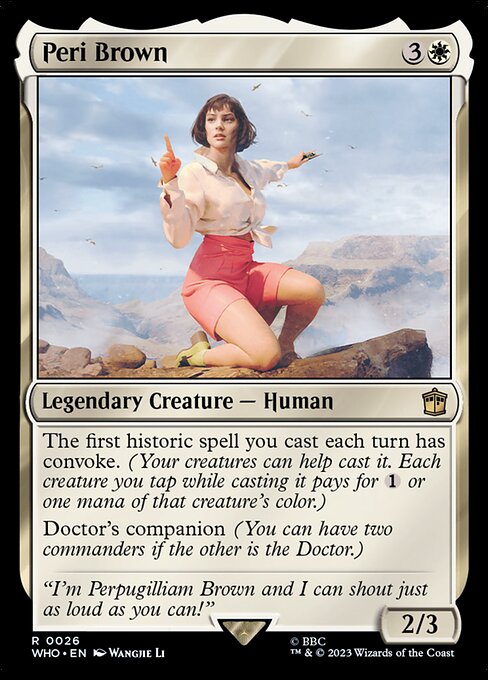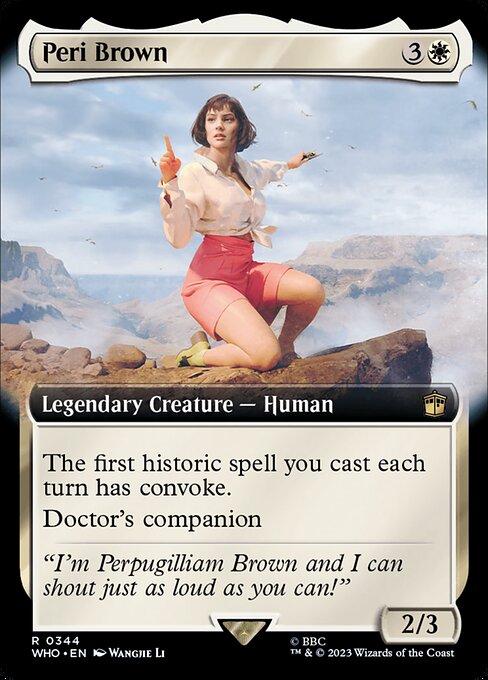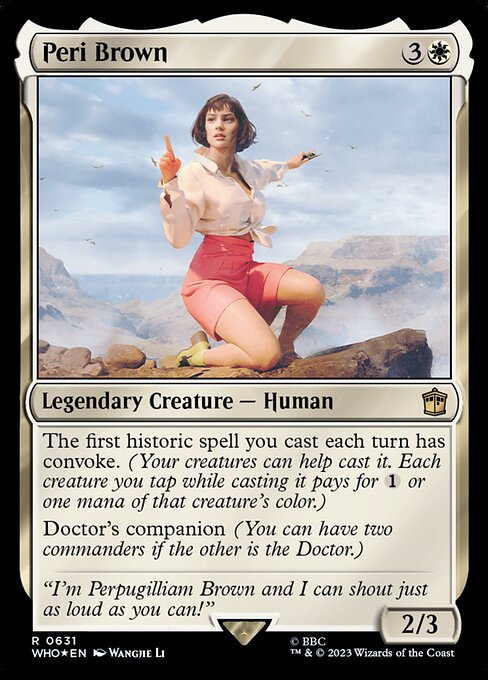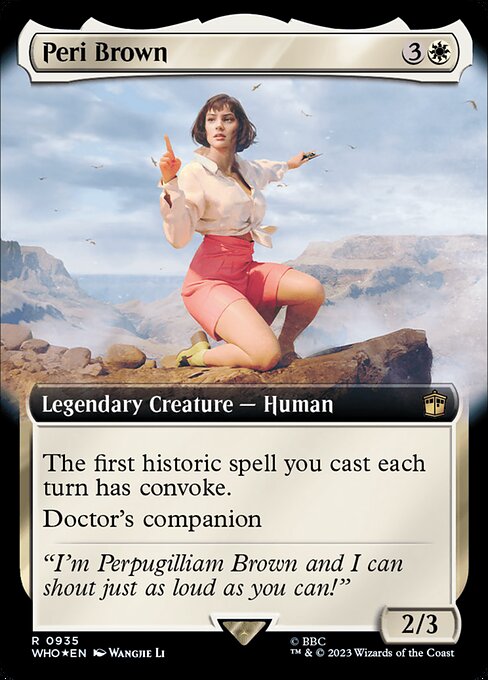standard
future
historic
gladiator
pioneer
explorer
modern
legacy
pauper
vintage
penny
commander
brawl
alchemy
paupercommander
duel
oldschool
premodern
Rulings
If a creature you control has a mana ability with in the cost, activating that ability while casting a spell with convoke will result in the creature being tapped before you pay the spell's costs. You won't be able to tap it again for convoke. Similarly, if you sacrifice a creature to activate a mana ability while casting a spell with convoke, that creature won't be on the battlefield when you pay the spell's costs, so you won't be able to tap it for convoke.
An effect that checks whether you control your commander is satisfied if you control one or both of your two commanders.
Although Doctor's companion is a new variant of the partner ability, the rules for partner have not otherwise changed. Notably, Time Lord Doctors and cards with Doctor's companion do not interact with cards which have another partner ability.
When calculating a spell's total cost, include any alternative costs, additional costs, or anything else that increases or reduces the cost to cast the spell. Convoke applies after the total cost is calculated. Convoke doesn't change a spell's mana cost or mana value.
The Doctor's companion ability allows you to have two commanders if one has the ability and the other is a legendary creature that is a Time Lord Doctor and has no other creature types. Creatures with the changeling ability, for example, can't be a second commander this way.
You can tap any untapped creature you control to convoke a spell, even one you haven't controlled continuously since the beginning of your most recent turn.
Once the game begins, your two commanders are tracked separately. If you cast one, you won't have to pay an additional the first time you cast the other. A player loses the game after having been dealt 21 combat damage from any one of them, not from both of them combined.
If your Commander deck has two commanders, you can include only cards whose own color identities are also found in your commanders' combined color identities.
Both commanders start in the command zone, and the remaining 98 cards (or 58 cards in a Commander Draft game) of your deck are shuffled to become your library.
If something refers to your commander while you have two commanders, it refers to one of them of your choice. If you are instructed to perform an action on your commander (e.g. put it from the command zone into your hand due to Command Beacon), you choose one of your commanders at the time the effect happens.
An effect that checks whether you control your commander is satisfied if you control one or both of your two commanders.
Although Doctor's companion is a new variant of the partner ability, the rules for partner have not otherwise changed. Notably, Time Lord Doctors and cards with Doctor's companion do not interact with cards which have another partner ability.
When calculating a spell's total cost, include any alternative costs, additional costs, or anything else that increases or reduces the cost to cast the spell. Convoke applies after the total cost is calculated. Convoke doesn't change a spell's mana cost or mana value.
The Doctor's companion ability allows you to have two commanders if one has the ability and the other is a legendary creature that is a Time Lord Doctor and has no other creature types. Creatures with the changeling ability, for example, can't be a second commander this way.
You can tap any untapped creature you control to convoke a spell, even one you haven't controlled continuously since the beginning of your most recent turn.
Once the game begins, your two commanders are tracked separately. If you cast one, you won't have to pay an additional the first time you cast the other. A player loses the game after having been dealt 21 combat damage from any one of them, not from both of them combined.
If your Commander deck has two commanders, you can include only cards whose own color identities are also found in your commanders' combined color identities.
Both commanders start in the command zone, and the remaining 98 cards (or 58 cards in a Commander Draft game) of your deck are shuffled to become your library.
If something refers to your commander while you have two commanders, it refers to one of them of your choice. If you are instructed to perform an action on your commander (e.g. put it from the command zone into your hand due to Command Beacon), you choose one of your commanders at the time the effect happens.
Rulings
If a creature you control has a mana ability with in the cost, activating that ability while casting a spell with convoke will result in the creature being tapped before you pay the spell's costs. You won't be able to tap it again for convoke. Similarly, if you sacrifice a creature to activate a mana ability while casting a spell with convoke, that creature won't be on the battlefield when you pay the spell's costs, so you won't be able to tap it for convoke.
An effect that checks whether you control your commander is satisfied if you control one or both of your two commanders.
Although Doctor's companion is a new variant of the partner ability, the rules for partner have not otherwise changed. Notably, Time Lord Doctors and cards with Doctor's companion do not interact with cards which have another partner ability.
When calculating a spell's total cost, include any alternative costs, additional costs, or anything else that increases or reduces the cost to cast the spell. Convoke applies after the total cost is calculated. Convoke doesn't change a spell's mana cost or mana value.
The Doctor's companion ability allows you to have two commanders if one has the ability and the other is a legendary creature that is a Time Lord Doctor and has no other creature types. Creatures with the changeling ability, for example, can't be a second commander this way.
You can tap any untapped creature you control to convoke a spell, even one you haven't controlled continuously since the beginning of your most recent turn.
Once the game begins, your two commanders are tracked separately. If you cast one, you won't have to pay an additional the first time you cast the other. A player loses the game after having been dealt 21 combat damage from any one of them, not from both of them combined.
If your Commander deck has two commanders, you can include only cards whose own color identities are also found in your commanders' combined color identities.
Both commanders start in the command zone, and the remaining 98 cards (or 58 cards in a Commander Draft game) of your deck are shuffled to become your library.
If something refers to your commander while you have two commanders, it refers to one of them of your choice. If you are instructed to perform an action on your commander (e.g. put it from the command zone into your hand due to Command Beacon), you choose one of your commanders at the time the effect happens.
An effect that checks whether you control your commander is satisfied if you control one or both of your two commanders.
Although Doctor's companion is a new variant of the partner ability, the rules for partner have not otherwise changed. Notably, Time Lord Doctors and cards with Doctor's companion do not interact with cards which have another partner ability.
When calculating a spell's total cost, include any alternative costs, additional costs, or anything else that increases or reduces the cost to cast the spell. Convoke applies after the total cost is calculated. Convoke doesn't change a spell's mana cost or mana value.
The Doctor's companion ability allows you to have two commanders if one has the ability and the other is a legendary creature that is a Time Lord Doctor and has no other creature types. Creatures with the changeling ability, for example, can't be a second commander this way.
You can tap any untapped creature you control to convoke a spell, even one you haven't controlled continuously since the beginning of your most recent turn.
Once the game begins, your two commanders are tracked separately. If you cast one, you won't have to pay an additional the first time you cast the other. A player loses the game after having been dealt 21 combat damage from any one of them, not from both of them combined.
If your Commander deck has two commanders, you can include only cards whose own color identities are also found in your commanders' combined color identities.
Both commanders start in the command zone, and the remaining 98 cards (or 58 cards in a Commander Draft game) of your deck are shuffled to become your library.
If something refers to your commander while you have two commanders, it refers to one of them of your choice. If you are instructed to perform an action on your commander (e.g. put it from the command zone into your hand due to Command Beacon), you choose one of your commanders at the time the effect happens.
Your collection? Your decks?
Want to manage your collection and/or create decks?


 0
0
 0.19€
0.19€


